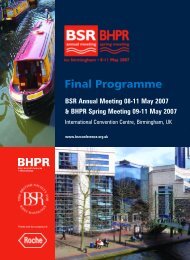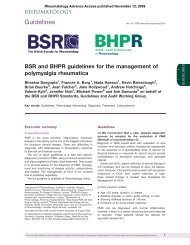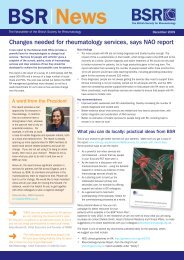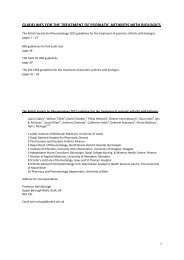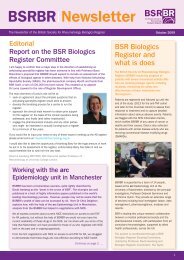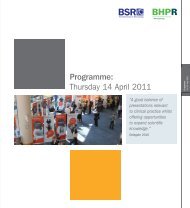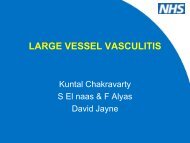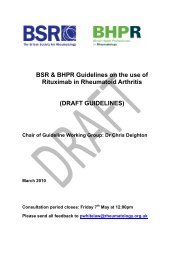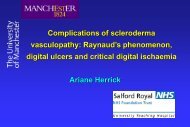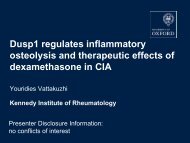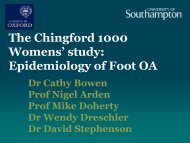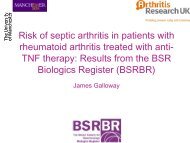BSRBR 10th Anniversary brochure - The British Society for ...
BSRBR 10th Anniversary brochure - The British Society for ...
BSRBR 10th Anniversary brochure - The British Society for ...
You also want an ePaper? Increase the reach of your titles
YUMPU automatically turns print PDFs into web optimized ePapers that Google loves.
Monitoring the use of biologics has spread from rheumatoid arthritis to other musculoskeletal<br />
diseases, and in 2012 recruitment will begin <strong>for</strong> BSR’s new ankylosing spondylitis register.<br />
Professor Gary Macfarlane, leader of the team that runs the new<br />
<strong>BSRBR</strong>-AS register, outlines the aims and ambitions <strong>for</strong> it.<br />
Rheumatologists in Scotland have a history<br />
of working together, so when I moved from<br />
Manchester to Aberdeen in 2005 it wasn’t<br />
long be<strong>for</strong>e I was approached about doing a<br />
research project. Ankylosing spondylitis soon<br />
emerged at the top of the agenda, so we set<br />
up the Scotland and Ireland Registry <strong>for</strong> AS<br />
(SIRAS), which quickly attracted funding<br />
from the pharmaceutical companies.<br />
When BSR proposed to set up an AS register<br />
to run parallel to <strong>BSRBR</strong>-RA, we were keen<br />
to get involved, because it seemed a natural<br />
progression to expand our work into England<br />
since we already had links with some English<br />
centres.<br />
SIRAS has approximately 1,400 patients<br />
registered. It covers everyone with a clinical<br />
diagnosis of AS, regardless of the therapies<br />
they are on. <strong>The</strong> <strong>BSRBR</strong>-AS will be slightly<br />
different as it will aim to recruit an initial<br />
cohort of 650 AS patients being treated with<br />
biologics and a similarly sized comparison<br />
cohort who are not on biologics.<br />
Twenty centres in England and Wales have<br />
expressed an interest in taking part, so we<br />
should have 33 centres including the 13<br />
already in SIRAS.<br />
Although <strong>BSRBR</strong>-AS is a separate<br />
undertaking, it will have strong links with<br />
Manchester as the unit there will collect<br />
safety data on any adverse events that occur<br />
to AS patients on biologics. <strong>The</strong>ir expertise<br />
in this field meant it seemed silly <strong>for</strong> us to<br />
try and collect this in<strong>for</strong>mation separately,<br />
although we will analyse the data they<br />
collect.<br />
Efficacy is another area we will look at;<br />
do patients on biologics fare better than<br />
patients not on these treatments? Because<br />
clinicians put patients on biologics <strong>for</strong><br />
specific reasons, <strong>for</strong> example, if their<br />
condition is deteriorating, and because<br />
patients have the right to choose not to go<br />
on biologics, it is a challenge to compare<br />
efficacy between one treatment and another.<br />
We have models that allow us to take the<br />
register’s observations of what happens and<br />
use them as the basis <strong>for</strong> making<br />
comparisons between similar groups<br />
of people.<br />
Other important questions occur, too.<br />
For example, when people go on biologic<br />
therapies, why do some fare better than<br />
others? If we can understand that, it can<br />
help us to make in<strong>for</strong>med decisions on<br />
treatments in the future.<br />
What takes time, though, is setting<br />
everything up, obtaining the funding and<br />
support of drug companies and the<br />
participation of regional centres. <strong>The</strong>n there<br />
is the technical part of designing the<br />
database and finalising the data sheets.<br />
For this, it is important to look at similar data<br />
collections, so we have set up a committee<br />
that includes representatives from Europe,<br />
North America and Australia to look at what<br />
other countries are doing and how we can<br />
collaborate with them.<br />
<strong>The</strong>re are bureaucratic hurdles, too. Be<strong>for</strong>e<br />
a study can take place, an NHS ethics<br />
committee has to give its approval. It will<br />
assess whether the overall balance of risk<br />
to benefit is acceptable, check through all<br />
issues of indemnity and ensure that patients<br />
are provided with enough in<strong>for</strong>mation and<br />
given enough time to make an in<strong>for</strong>med<br />
decision when they are approached to<br />
participate.<br />
Setting up <strong>BSRBR</strong>-AS has involved a lot of<br />
planning and preparation. <strong>The</strong> hope is that<br />
it will make a valuable contribution both to<br />
our knowledge and to the wellbeing of our<br />
patients.<br />
www.rheumatology.org.uk/<strong>BSRBR</strong> | 11



